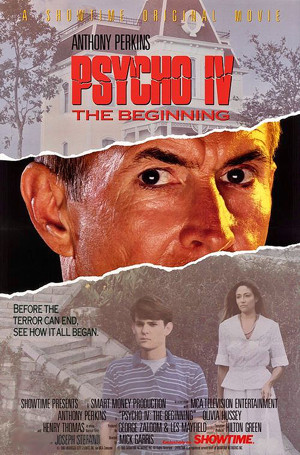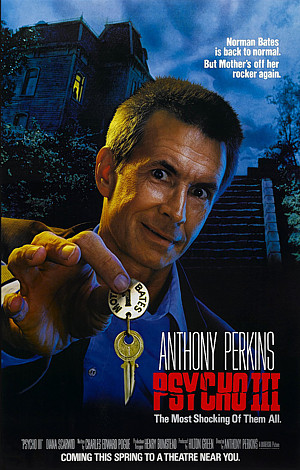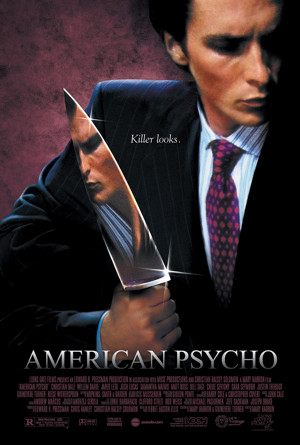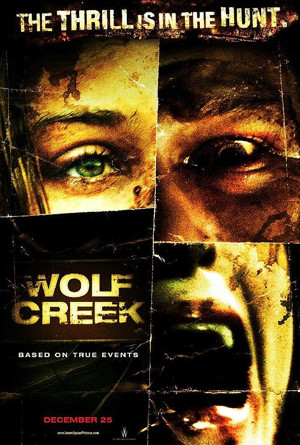 |
 |
Article by |
The PSYCHO Sequels
By James Futch
| PSYCHO MOVIE REVIEW |
| PSYCHO II MOVIE REVIEW |
| PSYCHO III MOVIE REVIEW |
And once again, the house stands empty…
The original ending of Pogue's screenplay allowed Norman to finally be free of Mother, as he stared up at the house of horrors through the back window of the police car on his way back to the institution. Universal execs wouldn't have it and ordered the rewritten "shock" ending that was filmed.
The ending still works, but, as Edward Gross, critic for Cinefantastique said, "In Pogue's script there was more to Norman's catharsis as he dueled with Mother, and considerably more terror as he continued to speak in both their voices. As the script concludes and Norman is taken back to the asylum, we're convinced that he has eradicated the madness in his mind and given a victory of sorts… the shock ending sends a chill through much of the audience, but it's a cheap shock that essentially negates all that has just occurred."
I agree. I think that the PSYCHO franchise should have ended, quietly, with Pogue's original version. And I would have liked to see the following scene, taken from the original screenplay right after Norman slashes apart Mrs. Spool's corpse:
The shredded, gash ridden-corpse slides down in the rocker, sawdust dripping in puddles all around the chair. Norman stands before this, his final victim, exhausted, spent. He looks contemptuously down on the torn body sprawled in the rocker. The knife falls limply, harmlessly from his fingers at his feet. He sinks wearily to the floor, propping his back against the bed.
Footsteps rapidly stomp upstairs and down the hall. Hunt and his deputies
barge in with drawn guns. No one in the room moves or speaks, bothering
to explain the bizarre scene in front of Hunt's astonished eyes.
He stares at the remains of Emma Spool.
HUNT
Good God, what was that?
NORMAN
(Calmly, no trace of stutter)
Madness… my madness… and now I've torn it out…
If the scene was ever filmed it will molder in the Universal warehouses rather than end up as an outtake in the bonus features that make DVD so fun. Because unlike the Collector's Edition DVD of PSYCHO (see review in Feo Amante's movie reviews) the sequels will never receive the DVD treatments they so richly deserve. Goodtimes Home Video, of the el cheapo DVDs with lurid cut and paste cases, is currently producing the PSYCHO II and III DVDs. There are no special features, except for a theatrical trailer, and the fact that PSYCHO III is in wide-screen. However, for just viewing the film, they are vastly superior over the old pan and scan VHS versions.
PSYCHO III remains the most tragic, and my favorite, of the series. Norman is consumed with remorse and guilt for his crimes, though he was insane when he killed, and ruminates on his case, "The past is never really past. It stays with me all the time and no matter how hard I try, I can't really escape. It's always there, throbbing inside you, coloring your perceptions of the world… and… and sometimes… controlling them."
I have always thought of PSYCHO III as Norman's film. Critics have waved it off as merely a modern remake of the original, and yes, while elements of the original are repeated, it is justified by the needs of the plot. Norman has certifiably gone off his rocker again and in this film, Anthony Perkins gives fans a chance to see Norman struggling onscreen with his compulsions, and often losing.
PSYCHO III flopped in theatres and the reviews were dismissive of the film, lumping it in with all the other mad slasher movies. Perkins was deeply affected by the box office failure of PSYCHO III, and sadly, never received the recognition and appreciation he deserved.
Caught in a Dream
Anthony Perkins died from complications due to AIDS related illnesses on September 12, 1992, and the acting world was worse for it, but not before he revived the Norman Bates character one last time.
 PSYCHO IV (1992) was based on the idea of a PSYCHO prequel, which would
have Norman talking about his childhood with flashbacks showing
the genesis of his madness. Unfortunately, instead of a more realistic
approach, the movie depicted Norman in a sparkling kitchen, rehabilitated
again after all those murders, spilling his guts on a talk radio show about matricide.
PSYCHO IV (1992) was based on the idea of a PSYCHO prequel, which would
have Norman talking about his childhood with flashbacks showing
the genesis of his madness. Unfortunately, instead of a more realistic
approach, the movie depicted Norman in a sparkling kitchen, rehabilitated
again after all those murders, spilling his guts on a talk radio show about matricide.
I don't know if Joseph Stefano, the man who sometimes freely accepts total credit for Robert Bloch's story, thought up this device but it proves to be a rather flimsy frame to hang the story on.
Threaded through Norman's phoned-in lament are scenes from the past, shot at a duplicate Bates Mansion and motel in Universal Studios, Florida, primarily of his teen years, played by Henry Thomas of E.T. fame. The scenes are at least interesting to look at, as the filmmakers imagined what the motel, house, and interior looked like forty years younger and with a fresh coat of paint.
Director Mick Garris (SLEEPWALKERS, THE FLY II, Masters of Horror: VALERIE ON THE STAIRS) did the best he could with Stefano's material, and Perkins delivered a heartfelt and powerful performance. Because many of the scenes in the movie were simply of Norman standing in a kitchen and talking on the phone, Perkins once again drew on his years of experience in theatre and treated the scenes as though he were on stage. The results are stunning. In spite of the fact that he was sick with AIDS at the time, he carried the movie with a top notch, highly dramatic performance of the long-suffering psychopath.
Although I do not consider PSYCHO IV a worthy entry in the series (it ignores much of the PSYCHO mythology and will confuse viewers of the first 3) and wish that the story could have ended with part III, the film manages to take life as a "what if it were all a dream" scenario, and good for a viewing if only to witness Anthony Perkins playing his Hamlet one last time before he died.
Fortunately, as Robert Bloch once said, Norman Bates will never die.
He lives on, in PSYCHO and its sequels.
![]()
END
PSYCHO II and PSYCHO III photos copyright 1983 and 1985 Universal Studios, Inc. All rights reserved. May be reprinted for newspapers and other periodicals.
This article copyright 2002 E.C.McMullen Jr.

|
| WHAT TO WEAR? | |
| YOU MIGHT ALSO ENJOY (Sub-Section: PSYCHO and Mother's Children) |
||
 |
 |
 |
| PSYCHO III MOVIE REVIEW |
AMERICAN PSYCHO MOVIE REVIEW |
WOLF CREEK MOVIE REVIEW |
FEO AMANTE'S HORROR THRILLERCreated by:E.C.McMullen Jr. FOLLOW ME @ |
| Amazon |
| ECMJr |
| Feo Blog |
| IMDb |
| Stage32 |
| YouTube |
| Zazzle Shop |

